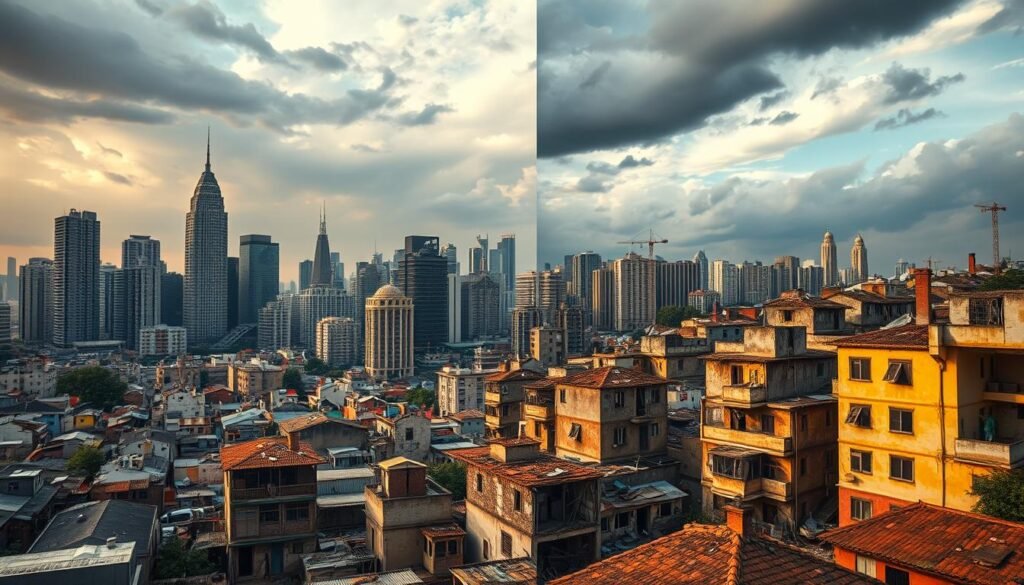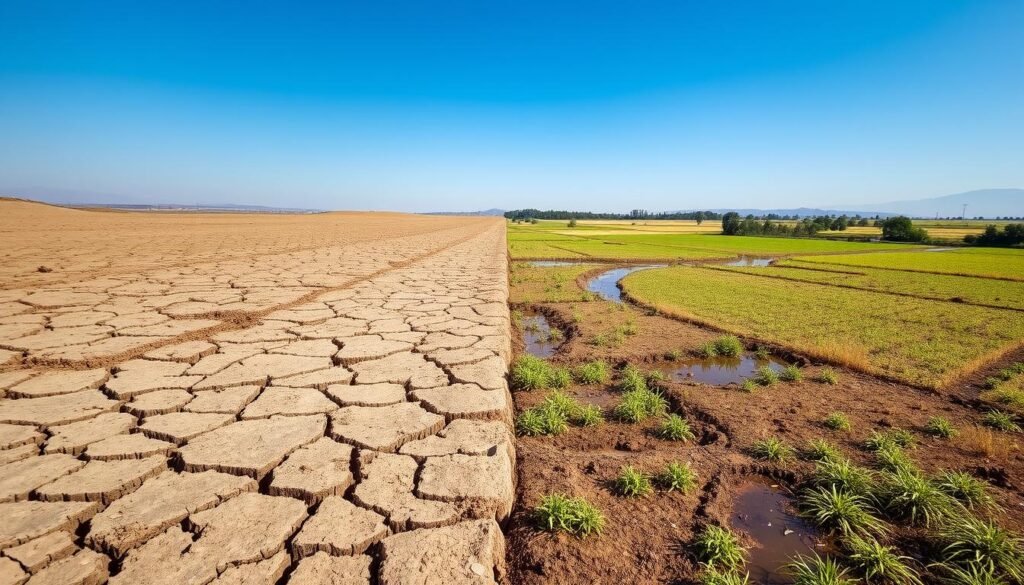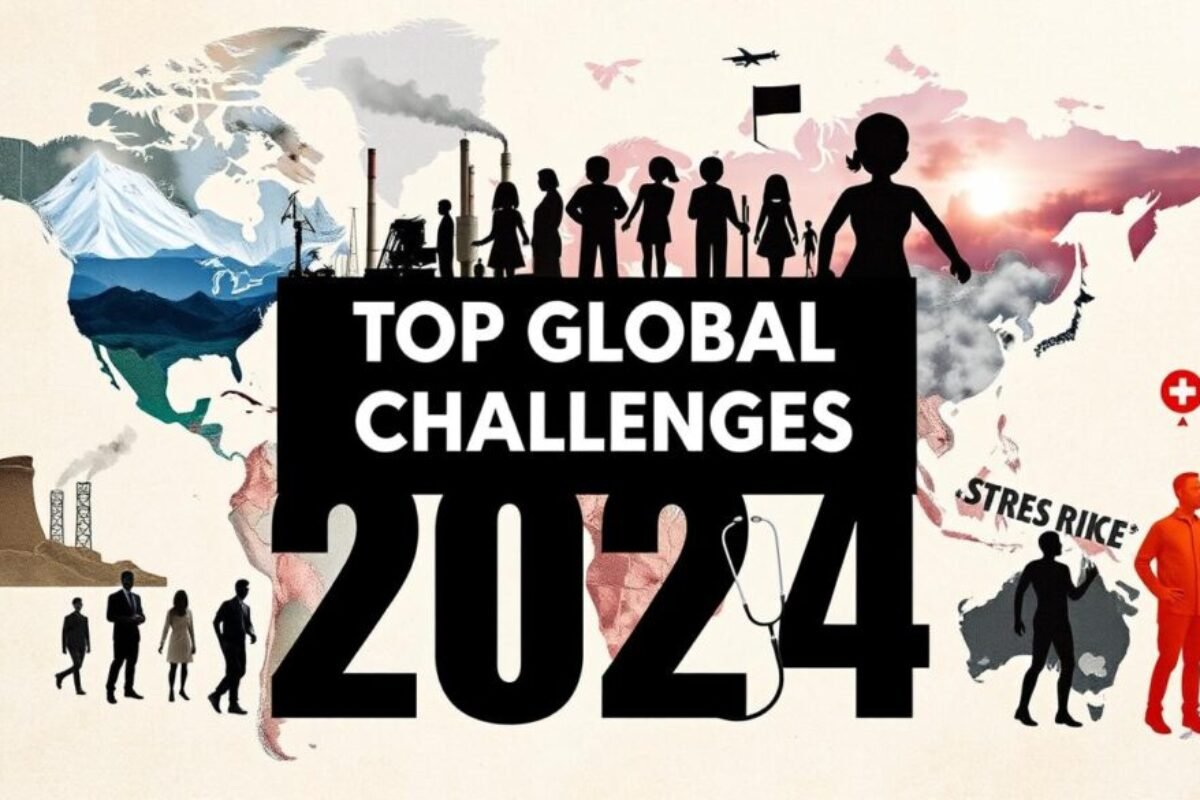Top Global Challenges World Facing in 2024 and it’s Priorities
As we look towards 2024, the world faces many global challenges that need our focus and action. We see 27 regions dealing with huge violence and political issues1. Also, over 4 billion people in more than 76 countries will vote in key elections1. The world is a mix of big problems and chances for betterment.
These challenges, like climate change, economic troubles, health crises, and global tensions, show we need new ideas and teamwork. As we move forward, we must fully tackle these issues. This will help create a better, fairer world for everyone.
Key Takeaways
- 27 regions are experiencing massive violence and political insecurity worldwide1
- Over 4 billion people in more than 76 countries will participate in elections in 20241
- Converging global challenges, including climate change, economic instability, and public health, demand systemic change and new thinking
- Multilateral cooperation and a holistic approach are key to solving today’s complex problems
- 2024 offers chances for improvement through democracy and global efforts to address major issues
1. Global Challenges
es 2024, Top World Issues and Priorities of 2024
In 2024, the world is dealing with many complex challenges. These include geopolitical tensions and cybersecurity threats. These issues are bigger and more complex than ever before2.
America’s main goals include stopping terrorist attacks and keeping drugs out. They also aim to prevent the spread of weapons of mass destruction2. This shows how security and global threats are connected.
The need for sustainable development and human rights is urgent. The Sustainable Development Goals (SDGs) offer a plan to tackle these issues. They cover climate change, health, and economic stability2.
People in America are now more worried about China’s power and the Israeli-Palestinian conflict. This shows how global issues affect our priorities2.
Understanding the Scale of Current Global Issues
The challenges of 2024 are connected and need a unified response2. Americans see the importance of keeping the U.S. military strong and preventing diseases. They also care about global climate change2.
This shows we need to tackle global problems together. A whole-of-society approach is necessary2.
Interconnected Nature of Modern Challenges
The COVID-19 pandemic showed how global issues are linked. It affected economies, social stability, and international cooperation3.
83 countries have agreed to protect civilians from explosive weapons in conflict. This shows we need a broad approach to address war’s human cost3.
Impact on International Development
As we face geopolitical tensions, cybersecurity threats, and the need for sustainable development and human rights, international development must change. A big shift is that Americans now focus more on domestic policy than foreign affairs2.
This change highlights the need for policymakers to balance global duties with domestic needs. It’s a challenge for the future2.
“The challenges we face in 2024 are not isolated events but are deeply interconnected, requiring a coordinated and complete response.”
| Emerging Priorities | Percentage Change |
|---|---|
| Limiting the power and influence of China | 17 percentage point increase from 20182 |
| Finding a solution to the Israeli-Palestinian conflict | 11 percentage point increase from 20182 |
| Limiting the power and influence of Russia | 8 percentage point increase from 20212 |
| Preventing the spread of infectious diseases | 19 percentage point decrease from 20212 |
Modern challenges need a holistic and flexible approach to international development. Policymakers must balance global goals with changing domestic needs. Understanding these issues is key for effective decision-making and resilience in 202423.
2. Converging Global Crises and Systemic Changes
Our world is facing many crises that need quick, united action. Progress on goals like ending poverty and full employment has been slow. Only a small part of Sustainable Development Goal (SDG) targets are on track, with many showing little progress4.
These crises threaten vulnerable people and societies. They make it hard to fight poverty and reduce inequality worldwide4.
The World Social Report 2024 stresses the need for global cooperation. It talks about tackling social protection, climate change, financial stability, and preventing conflicts4. National efforts need international support to tackle these crises4.
The report also emphasizes the importance of social protection during crises. It suggests expanding insurance for the vulnerable and putting people at the heart of development4.
Only 17% of SDG targets are on track, according to the UN Secretary-General’s 2024 SDG progress report5. The High-Level Political Forum (HLPF) on Sustainable Development has seen more countries participating. In 2020, 47 countries presented Voluntary National Reviews (VNRs), with 26 first-timers. In 2021, 44 countries presented, with 10 first-timers, 24 second-timers, and 10 third-timers5.
To tackle these crises and drive change, we must address digital transformation, food security and water scarcity, and cybersecurity and data privacy. We need new solutions and global cooperation to create a resilient and sustainable future.
“The world is facing multiple, cascading crises that are profoundly shaping the course of human development. Collective action and systemic changes are critical to address these challenges and build a more equitable, sustainable, and secure future.”
3. Democracy at Crossroads: Electoral Challenges in 2024
In 2024, the world will face a critical moment for democracy. Over 4 billion people in more than 70 countries will vote in major elections. The success of these elections will greatly affect global governance and how countries work together6.
Major elections will take place in the United States, the European Union, India, Pakistan, Indonesia, Taiwan, Mexico, Venezuela, and Senegal. These elections will face threats like AI manipulation and the rise of hybrid political systems7. These challenges could hurt public trust and make it hard for countries to work together on big issues8.
Major Elections Across Continents
The 2024 election season is key for democracy, with important votes happening worldwide6. These elections will shape the policies of countries and affect global cooperation. They will also influence how we tackle big issues like the global health crisis, poverty alleviation, and other global health problems78.
Threats to Democratic Processes
The upcoming elections will face threats like AI manipulation and hybrid political systems7. These challenges could harm the integrity of elections and reduce trust in democracy. This could threaten global stability and our ability to solve shared problems8.
Impact on Global Governance
The results of these elections will deeply affect global governance. They will shape international alliances and how we respond to conflicts and crises8. As we face health, poverty, and environmental challenges, working together will be key to solving these issues7.
“The integrity of these elections is critical for democracy’s future worldwide.”
4. Climate Change and Environmental Priorities
The world faces big challenges like technological disruptions, economic inequalities, and cybersecurity threats. But, fighting climate change is even more urgent. In 2024, we must deal with the harm a warmer planet causes. It threatens our health, food, and economy worldwide9.
The International Maritime Organization has set a goal to cut greenhouse gas emissions to zero by 205010. This shows we know climate action is key to solving other big problems too, like gender equality and economic growth9.
Initiatives
A comprehensive plan is essential to address climate change. This involves transforming how we produce energy, transport goods, and conduct business. Additionally, stronger collaboration and increased financial support from countries9 are crucial. The U.S. is taking steps, with laws that could create almost 18 million jobs in clean energy9.
As we get ready for the COP29 climate conference in Baku, Azerbaijan, from November 11 to 22, 202410, we must work together. We need to do more to fight and adapt to climate change. Using nature to help solve this problem is also important, as it can help a lot by 20309.
By facing the challenges of technological disruptions, economic inequalities, and cybersecurity threats, we can build a better future. A future that’s green, strong, and good for our planet and everyone in it9.
| Key Climate Priorities | Initiatives and Investments |
|---|---|
| Renewable Energy Transition | |
| Natural Climate Solutions | |
| Green Job Creation |

By embracing the challenges posed by technological disruptions, economic inequalities, and cybersecurity threats, the global community can chart a path towards a sustainable and resilient future.
“Climate action is increasingly linked to other global priorities, such as gender equality and economic development.”
5. International Security and Geopolitical Tensions
In 2024, the world faces many challenges. Regional conflicts and tensions affect us all11. The Russia-Ukraine war worries Europe’s energy security11. The Israel-Hamas war makes the Middle East unstable, testing international law11.
Regional Conflicts and Global Impact
The South China Sea is expected to see more tensions11. This shows how today’s problems are connected. The Taiwan Strait and Korean Peninsula might not see war11. These issues affect global security and the economy, causing problems for trade and investment12.
Military Escalations and Diplomatic Solutions
The world needs better ways to solve these problems. The United Nations, despite its challenges, is key for solving global issues11. New efforts, like the Ljubljana – The Hague Convention, aim to fight impunity and protect the law.
Nuclear Proliferation Concerns
Nuclear threats are also a big worry. Global powers’ competition raises the risk of accidents and big problems. Finding a balance between military strength and diplomacy is essential for peace and stability in the future.
6. Economic Instability and Financial Reform
The global economy is facing tough times. Economic inequality, public health crises, and geopolitical tensions are major hurdles. China’s economic slowdown is affecting emerging markets13. Central banks are tweaking their policies, keeping interest rates high13.
The US dollar might lose some value but will likely stay a top player in finance13. Financial reforms are needed to tackle economic instability and support growth13. Geopolitical risks are causing economic growth issues, inflation, and supply chain problems13.
The 2024 National Strategy for Combating Terrorist and Other Illicit Financing aims to protect the US financial system14. It focuses on fraud, ransomware, and terrorist financing threats14. The strategy aims to close regulatory gaps and improve system effectiveness14.
Experts from over 25 institutions have suggested a 10-point plan to improve the IMF and World Bank15. They also propose reforms to increase climate and development financing15. There are plans to reform global tax systems and financial safety nets for fairness15.
The world needs global cooperation and financial reforms now more than ever. Tackling economic inequality, health crises, and geopolitical tensions is key. This will help build a stronger, more sustainable global economy for the future.

“Urgent action is called for in strengthening global cooperation, particular in climate action and sustainable development financing.”
7. Global Health Systems and Pandemic Preparedness
Global health systems face big challenges in 2024. They need better pandemic preparedness and response. The Seventy-seventh World Health Assembly, from May 27 to June 1, will tackle these issues16.
Healthcare Infrastructure Development
Improving healthcare infrastructure, mainly in low- and middle-income countries, is key. The Health Assembly will focus on pandemic prevention and response. It will highlight the need for global readiness16.
Member States are backing efforts to make economies healthier for people and the planet. They see health and environmental sustainability as linked17.
Vaccine Distribution Equity
Vaccine distribution fairness is a big worry, with COVID-19 and future outbreaks. The Health Assembly will decide on health priorities, including vaccine access16. It will also honor six individuals and groups for their health work16.
Mental Health Crisis Management
The mental health crisis from COVID-19 needs more focus and resources. The Health Assembly will tackle this issue, aiming to improve health and well-being16. It will also discuss fighting antimicrobial resistance, a major health threat17.
The Seventy-seventh World Health Assembly is key for shaping healthcare’s future. It focuses on cybersecurity, sustainable development, and human rights. The world must unite to create strong, future-ready health systems18.
| Indicator | Value |
|---|---|
| Estimated annual global deaths due to drug-resistant bacterial infections | 1.3 million18 |
| Annual pregnancy-related deaths in Latin America and the Caribbean | 8,40018 |
| WHO’s Fourteenth General Programme of Work (GPW 14) strategy duration | 4 years18 |
“The Seventy-seventh World Health Assembly is the highest decision-making body of the organization, setting policies and approving budgets for the betterment of global health.”
8. Food Security and Resource Scarcity
Food security is a big problem worldwide in 2024. It’s made worse by climate change, wars, and economic troubles19. In poor countries, food prices go up by more than 5% often19. But, in richer countries, this problem is much less common19.
Real food prices are rising faster than overall prices in almost 60% of countries19. This is a big issue.
The food industry is a big polluter, causing 30% of greenhouse gas emissions19. But, changing just 10% of bad farm subsidies could help a lot. It could cut food prices by 18% and reduce pollution by 40% by 204019.
Many governments are trying to help. They’re using things like buffer stocks, price controls, and subsidies to keep food affordable19.
Water is also a big problem for growing food. We need new ideas and teamwork to solve it19. By 2050, we’ll need to grow 60% more food for 10 billion people19. Using water wisely and farming in a green way is key19.
| Indicator | 2023 Data |
|---|---|
| Global hunger (number of people) | 733 million20 |
| Undernourishment (number of people) | 713-757 million20 |
| Moderate or severe food insecurity (number of people) | 2.33 billion20 |
| Severe food insecurity (number of people) | 864 million20 |
| Unable to afford a healthy diet (number of people) | 2.8 billion20 |
Despite the challenges, there’s hope. Governments, groups, and partners are working together19. The World Bank is helping 296 million people in 90 countries19. Projects like the Food Systems Resilience Program are making a big difference19.

As we face climate change, wars, and economic troubles, food security is a top goal1920. By using new tech, farming green, and working together, we can make a better future19.
9. Technological Disruption and Digital Transformation
In 2024, technology is changing the world in big ways. It brings both chances and challenges. For example, AI can solve problems and create new things. But it also risks messing with elections and our personal info21.
Keeping our digital world safe is a big deal. Threats to our safety and privacy are growing. The gap in digital access also affects jobs and info worldwide22.
Yet, tech can help solve big issues like poverty and health problems. But we need to use it wisely. Companies and governments must figure out how to use tech for everyone’s good21.
| Key Trends | Percentage |
|---|---|
| Projected growth of global digital transformation market by 2026 | $3.4 trillion22 |
| Customers willing to stop doing business after one bad experience | 32%22 |
| Increase in daily active users of Microsoft Teams during COVID-19 | 145 million (from 32 million in 2020)22 |
| Unilever’s target for net-zero emissions from operations by 2030 | 100%22 |
We must keep up with tech changes. It’s key to tackle the tough parts and grab the good chances. This will help improve health, the economy, and fairness for all21.
“Technological disruption is the new normal, and we must embrace it with a clear vision and ethical framework to ensure it benefits humanity as a whole.”
10. Conclusion: Navigating Future Challenges and Opportunities
In 2024, we face many challenges that need global solutions. Elections around the world will shape how we govern and tackle crises23. Issues like climate change, economic troubles, and global tensions are key areas to focus on.
But, there are also chances for growth. New tech, like generative AI24, and changes in work23 offer both benefits and hurdles. Efforts like the B-Corp movement25 aim to fix economic gaps, protect the environment, and fight for justice.
To tackle these challenges, we need to be flexible, include everyone, and tackle global inequalities23. Working together, using new tech, and focusing on people and the planet can lead to a better future. This future will face fewer technological disruptions, economic inequalities, and cybersecurity threats.
FAQ
What are the major global challenges the world is facing in 2024?
In 2024, the world is dealing with big challenges like climate change and economic troubles. We also face health crises and tensions between countries. These problems are all connected and need big changes and teamwork to solve.
How are the Sustainable Development Goals (SDGs) relevant in addressing the global challenges of 2024?
The SDGs offer a plan to tackle these global issues together. We need changes in health, climate, and economy to handle the crises of 2024 and beyond.
What is the significance of the major elections taking place globally in 2024?
In 2024, over 4 billion people will vote in more than 70 countries. This is a key year for democracy and global leadership. Elections face threats from AI and new political systems, and their results will affect international relations and conflicts.
How is climate change impacting other global priorities in 2024?
Climate change is a big problem, affecting health, food, and the economy. It’s linked to goals like gender equality and economic growth. We need changes in energy and industry, and more global cooperation and money.
What are the key geopolitical tensions and security concerns in 2024?
Tensions are rising, with conflicts in Ukraine, Gaza, Sudan, and Yemen. The South China Sea, Taiwan Strait, and Korean Peninsula are also causing problems. The UN’s credibility is at risk, and new ways to fight impunity are being explored.
What are the main challenges facing the global economy in 2024?
The economy is facing weak growth and China’s slowdown is affecting others. Interest rates are staying high, and financial reforms are needed. Geopolitical risks are affecting growth, inflation, and supply chains worldwide.
How are global health systems addressing the ongoing challenges in 2024?
Health systems are working on better pandemic response and healthcare. They also need to ensure vaccine fairness. Mental health and antimicrobial resistance are big concerns that need more focus and resources.
What are the key issues related to food security and resource scarcity in 2024?
Food security is a big issue, made worse by climate change, conflicts, and economic problems. Higher food prices are causing inflation and unrest. We need better food management and water solutions to tackle these challenges.





February 14, 2025 @ 6:35 am
Thank you for your sharing. I am worried that I lack creative ideas. It is your article that makes me full of hope. Thank you. But, I have a question, can you help me?
March 2, 2025 @ 9:29 pm
Thanks for sharing. I read many of your blog posts, cool, your blog is very good.
April 3, 2025 @ 9:06 am
Your article helped me a lot, is there any more related content? Thanks!
August 10, 2025 @ 11:32 am
Thanks for sharing. I read many of your blog posts, cool, your blog is very good.
August 25, 2025 @ 11:01 am
Your point of view caught my eye and was very interesting. Thanks. I have a question for you.
August 27, 2025 @ 8:04 pm
Thank you for your sharing. I am worried that I lack creative ideas. It is your article that makes me full of hope. Thank you. But, I have a question, can you help me?
August 29, 2025 @ 8:31 pm
Thank you for your sharing. I am worried that I lack creative ideas. It is your article that makes me full of hope. Thank you. But, I have a question, can you help me? https://www.binance.com/ru-UA/register?ref=OMM3XK51
August 30, 2025 @ 1:05 am
Thanks for sharing. I read many of your blog posts, cool, your blog is very good.